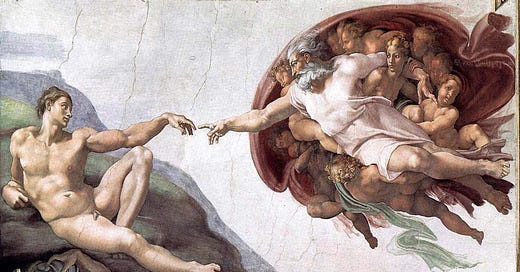“Even God would get fired as an active investor”
🔸 Plus: Your vintage football shirts are not an investment 🔸 Pret a Manger IPO 🔸 Exec claims Natwest fired her because she had bowel cancer 🔸
Your 2-minute guide to demystifying money and making you richer
God’s stock portfolio is a hot mess — just like yours
In 2021, Wesley Gray, the CEO of asset manager Alpha Architect, published a research paper that asked a cheeky question: If you were God, and had perfect knowledge of where the market was going, what would your investment portfolio look like?
God’s portfolio would be a mess, sometimes for years at a time, it turns out. There would be so many rough patches that Gray gave his study the title, “Even God Would Get Fired as an Active Investor.”
The study looked at all stocks between 1927 to 2016, and focused on how frequently stocks went into a “drawdown” — that is, a period when a stock falls from a peak price to its lowest price, and how long it takes those stocks to recover:
“Our bottom line result is that perfect foresight has great returns, but gut-wrenching drawdowns. In other words, an active manager who was clairvoyant (i.e. ‘God’), 1 and knew ahead of time exactly which stocks were going to be long-term winners and long-term losers, would likely get fired many times over if they were managing other people's money. Question: If God is omnipotent, could he create a long-term active investment strategy fund that was so good that he could never get fired? The answer is striking: God would get fired.”
Even if god perfectly timed the market he would see periodic crashes of 20%:
“The passive index would eat his lunch on multiple occasions -- often getting beaten by 50 percentage points -- or more -- on multiple occasions!”
The trouble with stocks is, they go down
This year, Morgan Stanley’s Michael Mauboussin and Dan Callahan took another look at the same concept in a study of 6,500 stocks from 1985 to 2024. During that period, the average peak drawdown was 81% and it took 3.8 years for those stocks to return to “par” (meaning their previous peak).
“In fact, about 54 percent of stocks never return to par after hitting bottom,” they wrote.
With this level of danger, why would anyone invest in stocks?
The answer is that the rewards accrue to people who hold for the long run and grit their teeth through the years after the drawdowns. The average return investors got if they held their stocks through the drawdown and waited for them to go up again — a period which takes on average 3.8 years, remember — was 338.5%. They tripled their investments.
That’s not bad.
You have a 1 in 50 chance of being god
Of course, the temptation is to ask, Why do I have to buy the whole market — in a S&P 500 ETF or index tracker — to get these results? Why not just buy the best stocks and ignore all the losers?
The most eye-popping statistic in the Morgan Stanley study is that just 2% of stocks drive 90% of the wealth created in the market.
A great example of this is Nvidia, the company whose semiconductor chips are in high demand from companies building artificial intelligence software, which needs incredibly fast computing power. Nvidia’s shares trade at $145 per share today, but in the late 1990s and early 2000s, when the company was only known for making video game hardware, its stock traded for years at less than $1. Between 2001 and 2002, Nvidia went through a period when its stock lost 90% of its value.
If that 2% statistic is true, it means that your individual stock picks have a 1 in 50 chance of being the good ones.
This is why diversification works. You don’t have to spend hours studying companies and picking stocks. Just buy the whole market and let the best 2% drive 90% of your gains. Yes, you’ll go through some dips. Even God would get fired if he was a money manager, during those times. But in the long run your chances of coming out ahead approach a near-certainty.
The Moneyin2 Guide to Wealth
The Moneyin2 Guide to Wealth will get you the biggest return on your savings by maximising cash matches from your employer, free cash from the government, and shielding your investment gains from tax. It takes you step-by-step through the world of pensions, SIPPs, ISAs and ETFs — all in plain English.
And for dessert …

Pret a Manger is considering an IPO. The seemingly ubiquitous chain has sales of £1.1 billion per year. Is now the time to buy equity in your sandwich addiction?
Exec claims Natwest fired her because she had bowel cancer. Here’s what happened next.
Your vintage football shirts are not an investment. Even a shirt from Manchester United’s treble-winning 1998-1999 season with “Beckham” on the back is probably only worth £120, max.
The markets, year-to-date
More from Moneyin2:
Do you want Moneyin2 to recommend your Substack?
Get in touch at contact@moneyin2.com!
We want to hear from you!
What money issues do you want us to tackle in this newsletter? Let us know at contact@moneyin2.com.
Follow us on social media
Facebook, TikTok, Instagram, Twitter, and Threads.
Partner with us!
If you want to sponsor Moneyin2 get in contact here.






